Welcome to this second Friends and Family letter, I hope you are staying warm and cozy this winter days! I wish you a festive, joyous and reflective time. Below you’ll read about my reflections as well as my wishes for the next decade: for political prisoners to be freed, the closing of the School of the Americas, to abolish I.C.E. and all extractive industries, justice and reparations to all the families impacted by the armed-conflict, the liberation of mother earth and her people, and new systems of hope, love, liberation, peace and justice. Personally, I hope this next decade I can gain the resiliency, vision, authenticity, and love I see in frontline communities who continue to fight everyday. Happy end of a decade!
I can’t believe it has been two months since I left the U.S. to join forces with the Network in Solidarity with the People of Guatemala (NISGUA) and that I have been on this journey of self-reflection, solidarity, growth, and mutuality. I am incredibly grateful for all of your support, and I am incredibly humbled to be sharing with and learning from comunidades Indígenas who are at the frontlines of climate change, militarization, extraction, and other oppressive systems.
This beautiful tierra and her people have expanded my understanding of justicia and movimientos sociales; being here has allowed me to see my own positionality and privileges in society, and has deepened my own existential sense of intentionality. What is my purpose and place in the movement? Is a question I ask myself daily.
Regardless of whether I find my place en la lucha, more than ever, the lessons you have taught me back home resonate deeply; our oppression and liberation is intersectional, deeply connected. We must be accomplices and support Black, Brown, and Indigenous efforts. We must challenge elite power structures, oppressive economic and foreign policies in the U.S. We must invest in transformational systems, practices, and movements and divest/eradicate from those that continue to hurt the seeds, the trees, the animals, the humans. There is so much at stake, that truly, we have nothing else but to imagine and build a new world…nothing else to lose but our chains.
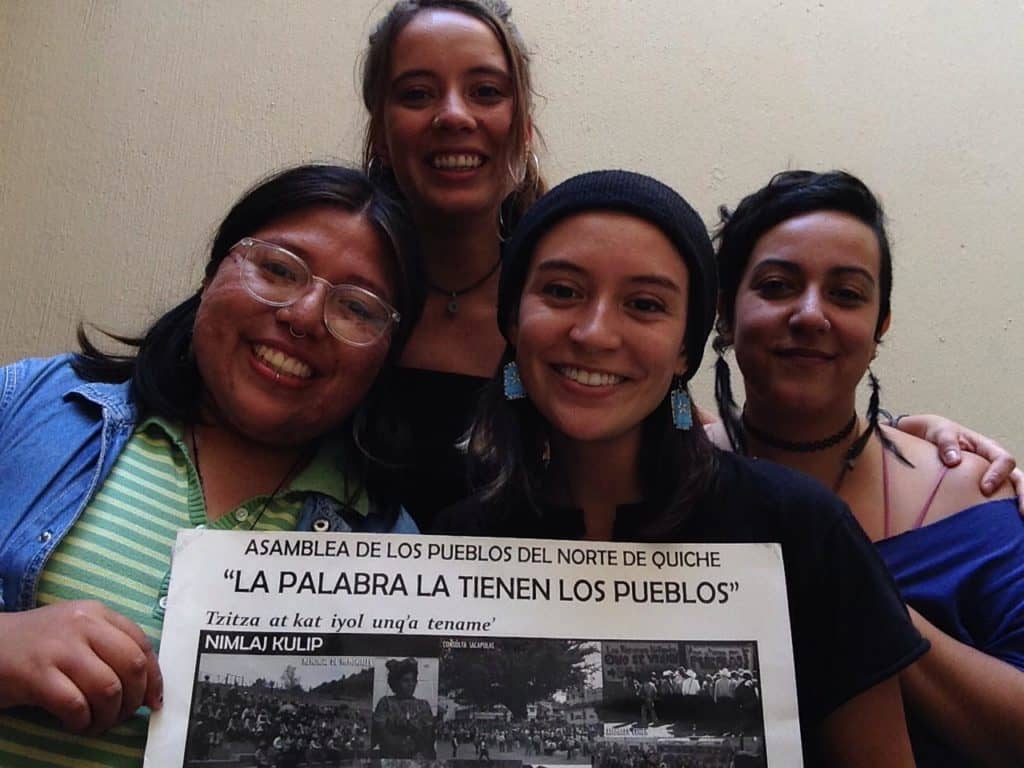
NISGUA 2019 GAP Accompaniers Isa Villalon, Christina Reyes, Nicole Estrada and Michelle C. Suarez
Our Struggles are connected and so is our liberation
Our struggles are connected. From the disproportionate killings of Black people at the hands of the police in the United States, to the missing and murdered Indigenous women in Canada, to the criminalization and separation of migrant families, and the militarization of Indigenous communities in Guatemala and Latin America by the U.S. Black, Brown, and People of Color have all been defined as “the other” to justify a long history of violence and repression and have been the targets of oppressive institutions and policies, such as the police, which are the result of slavery and the colonization of the Americas. Systems and institutions that seek to abuse and erase people, that were made, not to protect the well-being of communities and the earth, but rather, were made to protect capital and power at the hands of corporate interests and the elite.
One such oppressive institution created to foster U.S. imperialism while also securing military control is the School of the Americas, renamed the Western Hemisphere for Security Cooperation, an institution that has given military training to some of the most brutal dictators in Latin America including Jorge Rafael Videla in Argentina, Augusto Pinochet in Chile, and of course José Efraín Ríos Mont in Guatemala. These dictators were responsible for some of the worst crimes committed against humanity including genocide, rape, and forced disappearance while also facilitating U.S. Imperialism that continues to take new forms such as fossil fuel projects in order to extract and exploit resources. For example, upon analyzing the maps of the regions most impacted by the Internal Armed Conflict in Guatemala, which are regions that have the highest concentration of Indigenous peoples, and the maps of hydroelectric and mining projects, there is an overlap.
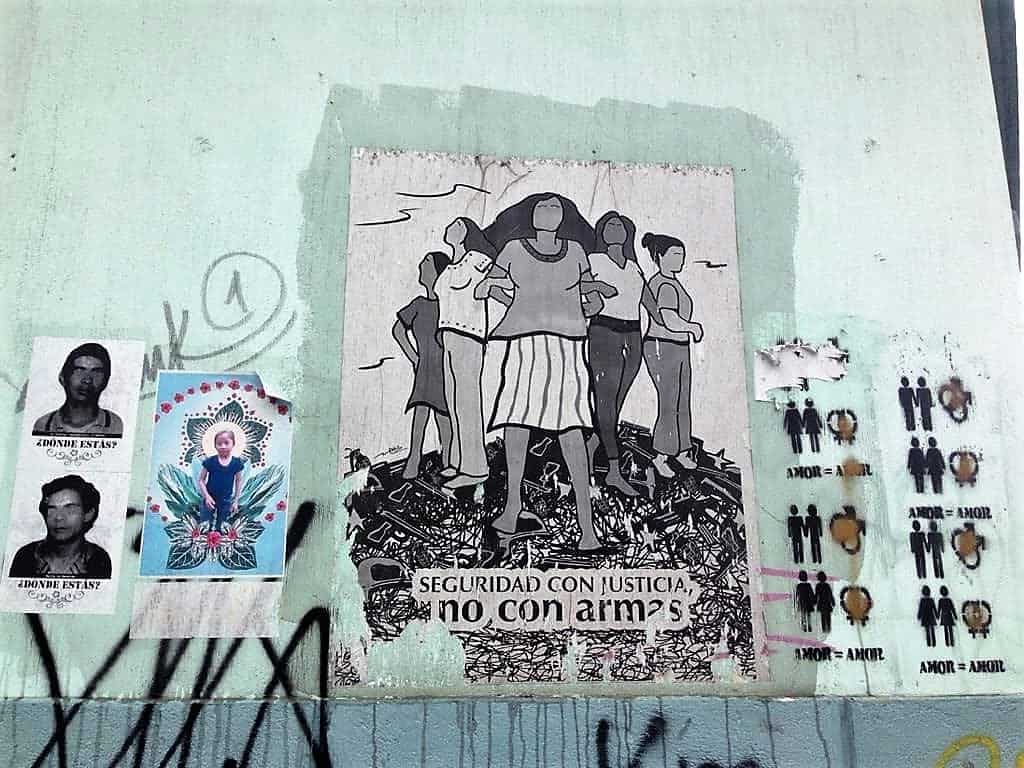
Safety with justice, not with firearms. Photo credit: Nicole Estrada
The criminalization of Indigenous communities in these regions continue to be on the rise regardless of their clear refusal through their ancestral practices and laws like Consultas Comunitarias de Buena Fe (community consultations). Those defending the lands, water and territories such as the case of human rights defender Francisco Lucas Pedro (whom I met back in October) from Barillas, Huehuetenango, has been persecuted since 2012 by extractive corporations and on December 21st 2019 was detained by the Policia Nacional Civil (police) for crimes he has never committed*. It is clear that this new wave of criminalization is connected to his efforts of defending el río Q’amB’alam from Hidro Santa Cruz, a hydroelectric project proposed by Spanish Ecoener/ Hardly Energia and with ties to World Bank funding, that was successfully rejected by Francisco and other community members. #ChichoLibre
Our struggles are connected and so is our liberation. For years, social movements have been calling for the abolition of the police and the prison-industrial complex, now communities continue to call for the abolition of I.C.E. and the abolition of extractive industries that are hurting their communities and the earth. I am reminded that is all connected and that Black, Indigenous, and People of Color have always had ancestral justice systems and practices. I look to the past and modern abolitionist movements and leaders like Miriame Kaba, who has been advocating for transformative justice practices and the abolition of prisons as well to Indigenous communities in Guatemala who have been practicing community accountability and Consultas de Buena Fe to know that there are liberatory practices and solutions to societal problems.
Our struggles are many and connected, the actors in these oppressive systems are operating together and under the same laws, but we don’t have to. I challenge you to think of ways and practices in your life in which community and family members can be held accountable without resorting to institutional punishment. I challenge us to dig deeper into the roots of our issues as a society and redefine/reclaim our ways.
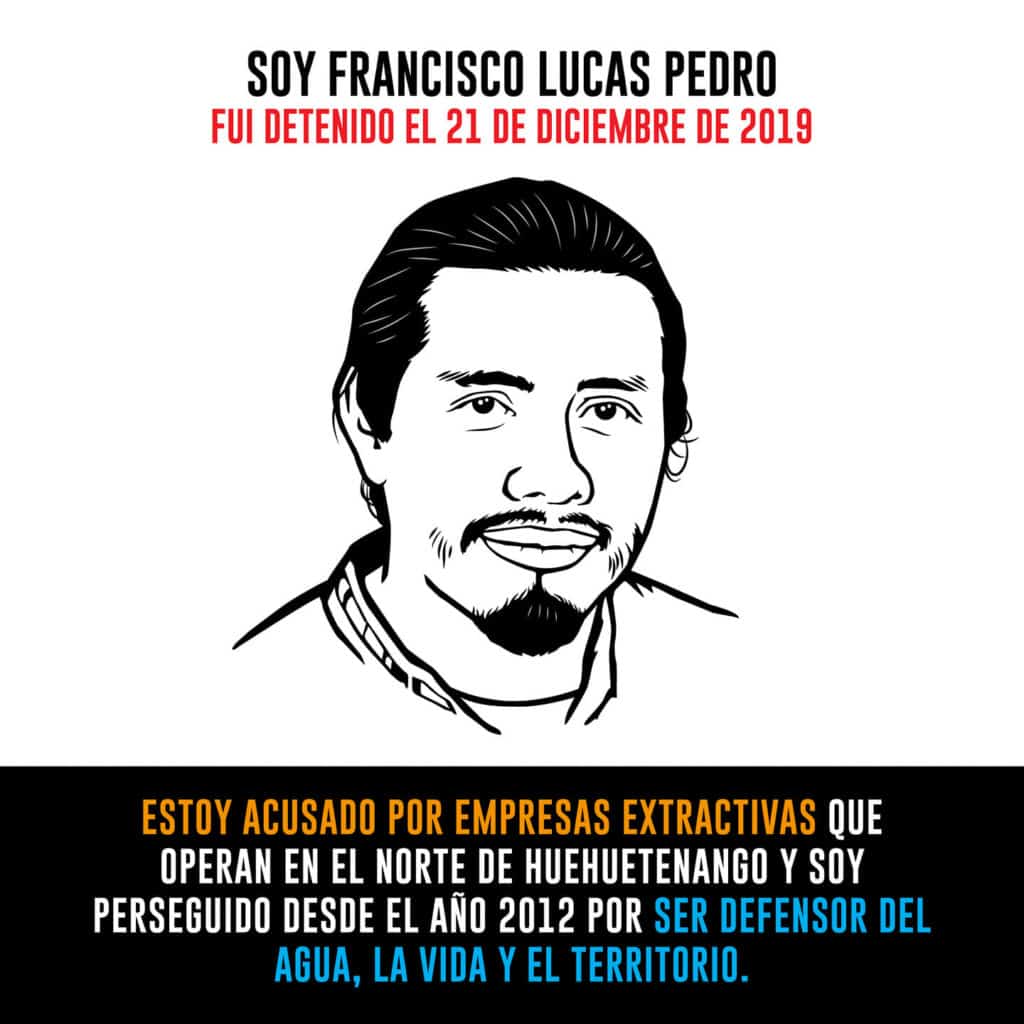
“I am Francisco Lucas Pedro and was detained on December 21st, 2019. I am accused by extractive industries that operate on North Huehuetenango and I have been persecuted since 2012 for defending the water, life, and territory.” Image credit: Festivales Solidarios
Maya Ixil Genocide Lucas Garcia Case
In 2013, survivors and members of the Association for Justice and Reconciliation (AJR) with the support of their legal team, Center for Human Rights Legal Action (CALDH), and other organizations such as The Human Rights Office of the Archdiocese of Guatemala (ODHAG) set a global precedent when former dictator José Efraín Ríos Montt was found guilty of genocide and crimes against Mayan communities that left 200,000 people killed, 626 recorded massacres, 45,000 people forcibly disappeared, and more than 1 million refugees displaced largely to Mexico (Findings of the UN Commission for Historical Clarification, 1999).
Guatemala’s highest court declared que sí hubo genocidio (yes, there was a genocide) which recognized and gave validity to the thousands of accounts by survivors and family members who had suffered torture, rape, disappearance, death and crimes against humanity at the hands of the military. Ten days later, the highest court illegally voted to annul the trial proceedings and send the case back to a retrial, Rios Montt died under house arrest awaiting trial.
Six years later, on November 24th, 2019, the Maya Ixil got to witness another historic moment in Guatemala’s memoria with the indictment of three-high ranking military officials who were in power during the Romeo Lucas Garcia government (1978-1982): César Octavio Noguera Argueta, Benedicto Lucas Garcia, and Manuel Callejas y Callejas. The three men have been indicted on charges of genocide, crimes against humanity and forced disappearance. It is also important to note Benedicto Lucas Garcia and Manuel Callejas y Callejas are already serving prison and have been charged with crimes against humanity, aggravated sexual assault and enforced disappearance in the Molina Theissen Case. Both military officials were also graduates from the School of the Americas.
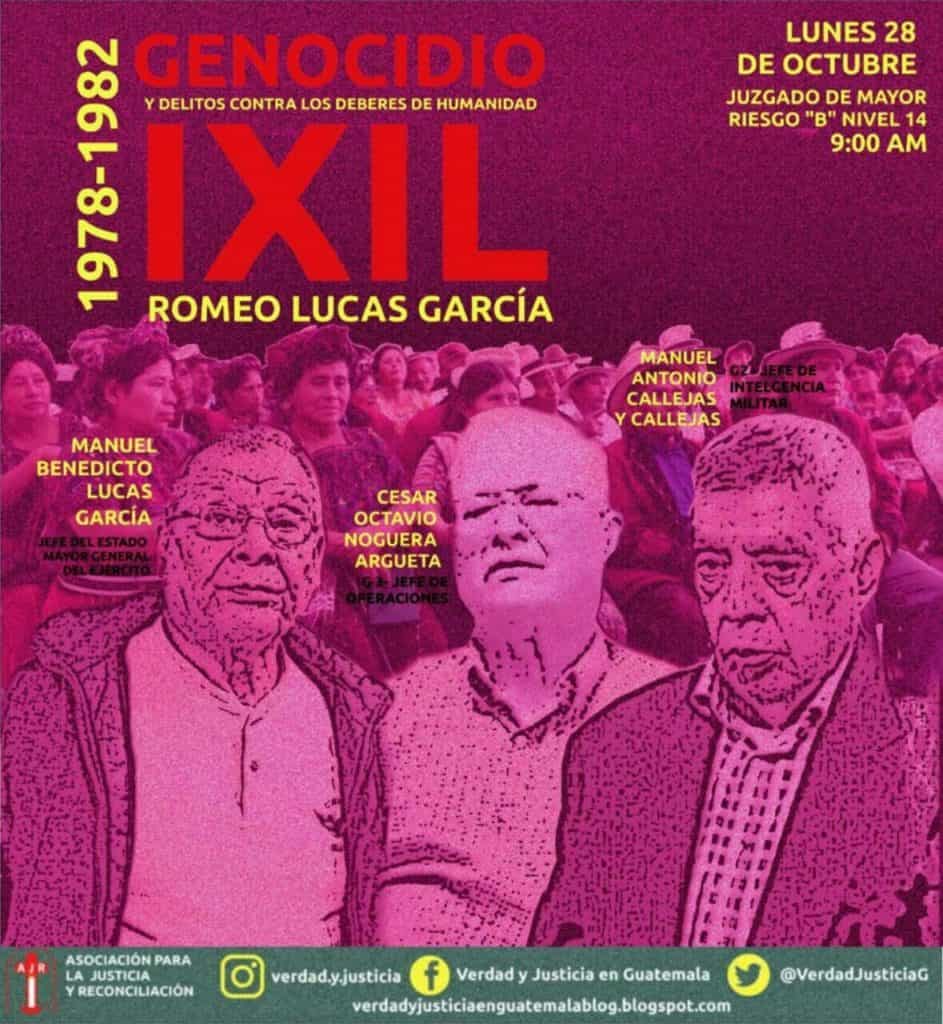
The three accused ex-military officials and case info.
Image credit: Verdad y Justicia
On our way to the Torre de Tribunales the Mayor Riesgo where the trial of the three ex military officials will take place, every step of the way is a potential risk for survivors and family members attending. Most communities travel from the Ixil region to Guatemala City, the Ixil region is one of the regions with the most recorded killings during the armed-conflict, and it is composed of mainly Mayan towns including Nebab, Chacul, and Cotzal. For some elder survivors and family members this is their third time attending a genocide case in the capital, they are very familiar with the risks and the many violent tactics used to silence them and keep them from seeking justice. Nevertheless their search for justice has been a long and painful road, each step of the way paving a different shade of justice; a hope of a future where history doesn’t repeat itself; a recognition of their suffering.
As an acompañante de Derechos Humanos we must also take safety measures and precautions, you never know who is listening and watching your steps, if you put yourself at risk, you put the communities you accompany at risk. We travel by taxi to meet the group before the trial begins. As we entered the house where acompañadxs are staying, my partner and I put on our ACOGUATE chalecos to identify us as acompañantes. We meet with the local organizations coordinating and also accompanying the group, we say hello and join the group for breakfast. In the room there are people from various communities from the Ixil region, some speaking in their native Mayan languages, and others speaking in Spanish. We share smiles and coffee, then we get briefed on the plan for the day.
Time is such an important factor when attending trials as there are potential risks for survivors and family members every step of the way. On that particular day, we leave to the Torre de Tribunales a bit earlier than usual, there is always the risk of encountering intimidation by those actors who still defend impunity for the military and who still deny the genocide. I am told on previous times there had been verbal aggression towards survivors while going to the courtroom in the elevator. I am told on the way to the courtroom your never know who the group might encounter; it could be family members of the accused, ex military officials, media, anyone.
We get there and start walking, it’s a bit earlier so the group has to wait outside for a couple of minutes, finally the guards open the security gates and there are only two waiting lines; one for mxn and another one for womxn. We go through security, the guards look through everyone’s bags, we continue to walk together, and then go through another security checkpoint. Then we wait for the elevators, since the group is earlier than usual, the risk of encountering actors who might attack the group decreases, but you never know. We wait for several minutes, the courtroom is on the 14th floor, finally the first elevator arrives, half the group goes and the other half stays waiting for the other elevator. I stayed behind with the second group. We’re early, and I think to myself, we have time and we’ll meet upstairs. Finally the other elevator arrives, we get in. The group is a little cramped in the elevator, the women smile, there’s also an eagerness in the air.
We get to the 14th floor, we exit the elevator, the courtroom hasn’t opened yet. I notice a heaviness in the air, everyone is silent and it makes me wonder why. Then I realize the group is standing within feet from the accused…
Benedicto Lucas Garcia, Cesar Octavio Noguera Argueta, Manuel Antonio Callejas y Callejas are waiting in handcuffs for the courtroom to open.
The group stands right behind the accused; survivors of the genocide and family members who lost people in the war.
There’s complete silence in the hallway. There’s a heaviness in the air.
Trauma.
Grief.
Fear.
Memoria.
Justice.
A genocide.
Mayan ancestors.
Victims.
Survivors.
Family members.
No eye contact.
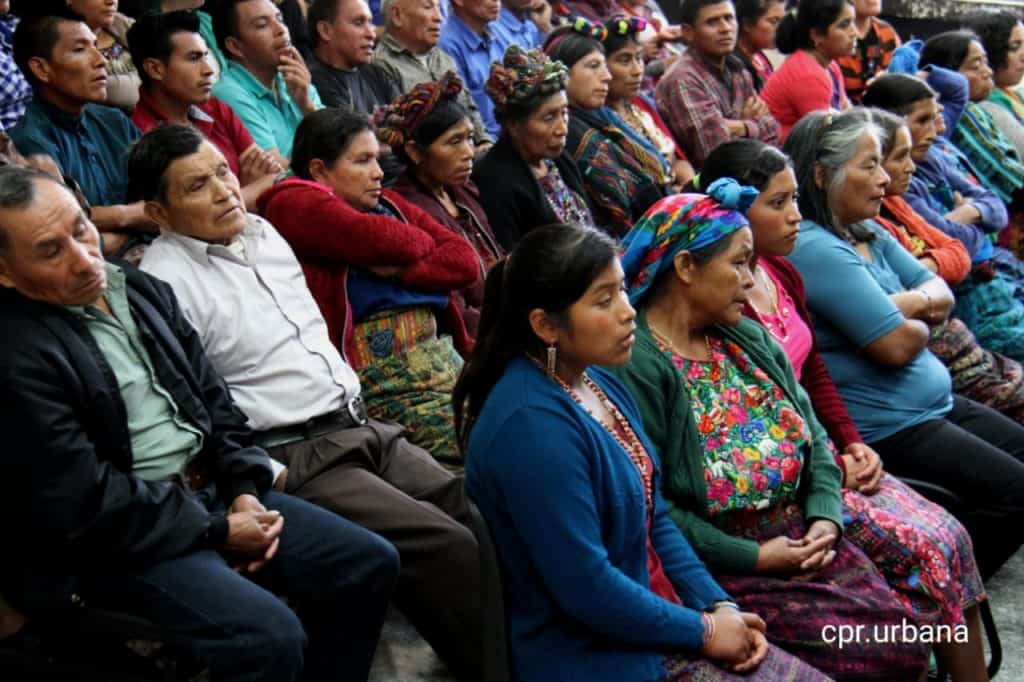
AJR survivors and family members in the courtroom. Photo credit: CPR- Urbana
What does liberation mean to you? And what are you willing to divest from?
Check out the following ways in which you can support and continue learning about Guatemala’s history and its search for justice:
- Support NISGUA, make a donation here
- Learn more and support the School of the Americas Watch
- Learn more about Guatemala’s history
Con Amor y Gratitud,
Michelle C. Suarez M.
*On January 3, Francisco Lucas charges were dismissed by a judge, and he was immediately release.

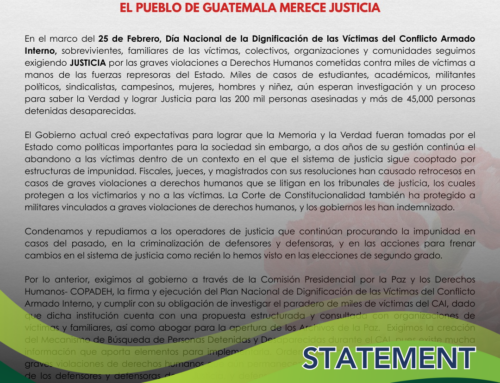



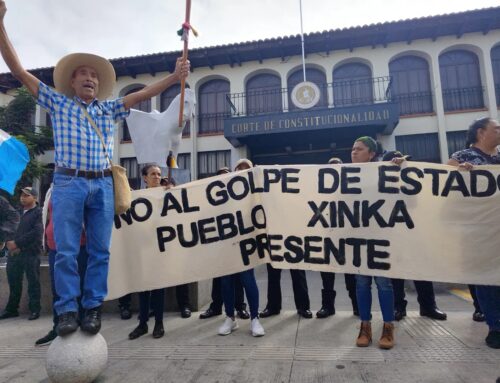
Leave A Comment